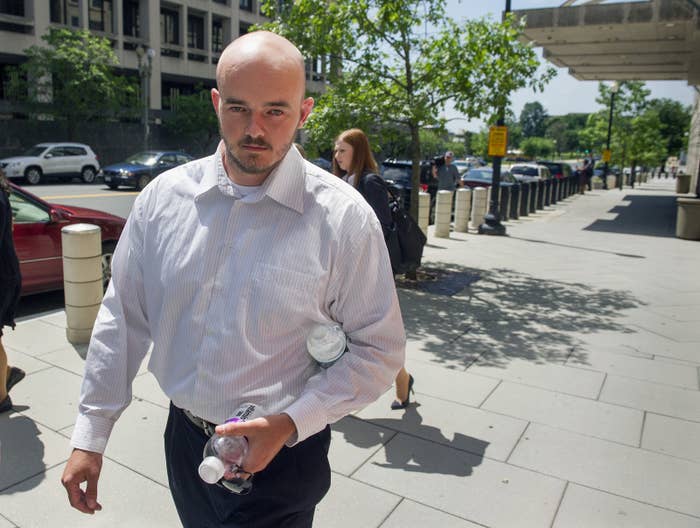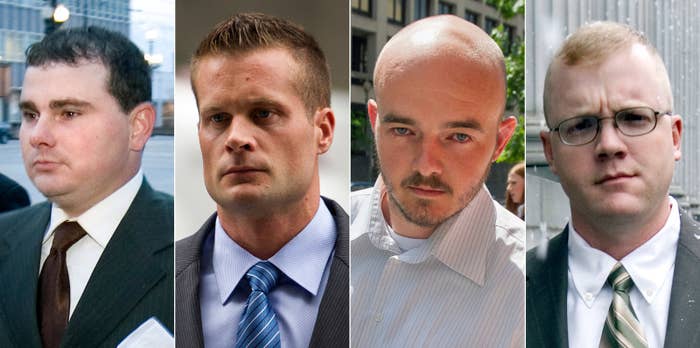
An appeals court on Friday vacated the first-degree murder conviction of a Blackwater guard charged with being involved in a massacre in Iraq — and ordered a new trial for him.
Nicholas Slatten was charged in the 2007 incident where private security contractors working for the US government opened fire in Baghdad and left more than a dozen Iraqi civilians dead and many others wounded. The US Court of Appeals for the DC Circuit ruled on Friday that Slatten should have been tried separately from the other Blackwater contractors involved.
"The Court concludes that the district court abused its discretion in denying Slatten’s motion to sever his trial from that of his co-defendants and therefore vacates his conviction and remands for a new trial," the three-judge appeals panel that heard the case wrote in a joint opinion. Slatten had previously been sentenced to a lifetime in prison.
The ruling is a blow to federal prosecutors in Washington, DC, who overcame a series of legal obstacles in the years after the shooting just to get to a trial. The trial lasted months, and involved considerable logistical effort to bring in witnesses from Iraq. A spokesman for the US attorney's office in Washington, DC, said they were reviewing the opinion, and declined to comment on whether they would pursue a new trial against Slatten.
The court also called for the resentencing of three Blackwater guards, Paul Slough, Evan Liberty and Dustin Heard, who were found guilty of voluntary manslaughter, attempted manslaughter, and using and discharging a firearm in relation to a crime of violence. The three had previously been sentenced to 30 years in prison.
The DC Circuit — this time in a 2-1 decision — held that the mandatory sentences were "grossly disproportionate to their culpability for using government-issued weapons in a war zone."

In Slatten's case, the three-judge appeals panel found that the trial judge was wrong to deny his request to have a separate trial from the other three defendants. Slatten's argument centered on evidence from another defendant that Slatten did not fire the first shot. The trial judge found that the evidence was inadmissible hearsay. The DC Circuit disagreed, writing that the information was "vital" to Slatten's efforts to defend himself. Since the evidence wouldn't be admissible in the other defendants' cases, Slatten should have had a separate trial, the court said.
The court rejected Slatten's argument that the indictment against him amounted to vindictive prosecution, an issue Slatten raised after he was charged with first-degree murder after other options for prosecution expired.
The Blackwater team was sent on September 16, 2007 to provide evacuation support when a car bomb went off in Baghdad near a diplomat. The convoy, know as Raven 23, was instead directed to Nisur Square, a busy traffic circle, where they stopped traffic.
A few minutes later, members of the convoy opened fire. The car they were shooting at was a white Kia sedan, which the court opinion states had been "flagged" by intelligence as a type of car that might be used as a car bomb. The Kia rolled forward despite the driver being shot. Slatten's conviction came from the death of the driver of the Kia.
Two Iraqi policer officials gestured the shooting should stop, according to the opinion. But the car continued to roll forward, and the convoy launched "heavy gunfire" and grenades its way until it caught fire.
"Indiscriminate shooting" from the convoy went beyond the vehicle toward the rest of the square, where more victims were hit at they tried to escape the area.
The high-profile incident left 31 Iraqis dead or wounded. Prosecutors argued the fire was one-sided, but the defendants argued they believed they were under attack.
A lower court judge dismissed the case in 2009, after finding that prosecutors had wrongly relied on compelled statements the guards gave soon after the shooting. The DC Circuit revived the case in 2011. Slatten originally faced the same charges as the other defendants, but he successfully argued that the DC Circuit's 2011 order did not apply to him, and that as a result prosecutors had missed the window to reindict him for manslaughter.
The DC Circuit sided with Slatten in 2014. At that point, the only charge that prosecutors could bring was first-degree murder, which they did. The trial lasted 11 weeks, and the jury deliberated for another seven weeks before returning the guilty verdicts in October 2014.

